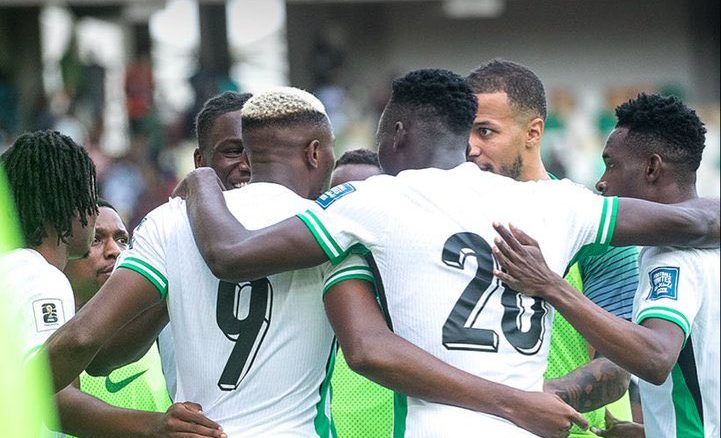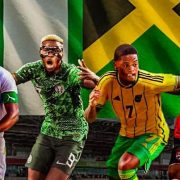From coaching staff to players and technical crew, nearly everyone who has worked under the Nigerian Football Federation has, at some point, been owed money.
By Tuka Letura
Rumours began circulating on Tuesday, 10 November 2025, that the Super Eagles of Nigeria were set to skip training ahead of their crucial World Cup play-off against Gabon in Morocco. The match, scheduled for Thursday evening, was too important to risk any distractions. Yet the news spread quickly — the players were angry, and for good reason.
By the afternoon, Nigerians had taken to social media to debate the situation. Some supported the players, insisting they had every right to stand their ground against a football federation with a history of poor accountability. Others saw it differently, arguing that the timing was ill-judged and that the players had chosen the worst possible moment to make their point.
Later that evening, captain, William Troost-Ekong, confirmed what BBC journalist, Oluwashina Okeleji, had earlier reported in a post on X: the team had indeed refused to train because the NFF had failed to pay their bonuses.
The captain wrote, “Once a resolution is found, we will be the first to confirm. Any other statement, claim, or especially demands other than the rightful request written about below are false. All we want, and will continue to do, is focus on the big games ahead.”
By Wednesday morning, the NFF had made the overdue payments. Troost-Ekong posted on X again that night to announce that the issue had been resolved, and the team returned to training less than 24 hours before their 5 p.m. kick-off against Gabon.

In truth, none of the drama that had just unfolded felt new, because it wasn’t.
For the men’s national team, being owed bonuses is almost a rite of passage. It has become part of the fabric of Nigerian football; a system where those who represent the country are often made to wait for what they have earned. From coaching staff to players and technical crew, nearly everyone who has worked under the Nigerian Football Federation has, at some point, been owed money.
“I’m the only Nigerian coach to ever resign” said former Super Eagles player and coach, Sunday Oliseh. “The NFF still owes me $26,000. I’d win if I went to FIFA, but I can’t drag my fatherland to court.”
The story stretches back decades, and there are still many players and coaches, both dead and alive, who are owed money. From the France ’98 World Cup to the 2014 tournament in Brazil, and through several editions of the Africa Cup of Nations, disputes over unpaid allowances have shadowed Nigeria’s most successful football moments. At times, players have boycotted training or refused to travel until payments were confirmed. Each cycle ends the same way — a hurried settlement, a temporary peace, and silence until the next crisis.

This conflict, though framed as a dispute over money, runs much deeper. It raises questions of respect, trust, and the value placed on service to the nation. For players who train and compete under immense pressure, unpaid bonuses represent both administrative failure and betrayal. Patriotism, after all, isn’t a one-way street.
The players cannot be cajoled into performing for a country that denies them what is rightfully theirs, especially when the funds have already been released by the government but remain stuck with the NFF. At that point, it is no longer a delay; it is misappropriation. And misappropriating cleared bonuses is a far greater act of unpatriotism than players refusing to train until they are paid.
Officials often mask the issue with talk of “timing” or “bureaucracy”, placing results above welfare. But the truth is simpler and far less flattering: payments are delayed because someone, somewhere, failed to process them or diverted the funds. That failure, that neglect of duty and disregard for those representing the country, is among the highest forms of unpatriotism there is.
It shouldn’t be so, but it happens often enough that no one is truly shocked anymore. Each episode chips away at morale and performance. The pride of wearing the national colours remains, but the emotional cost grows heavier with every dispute. Players in the diaspora are also watching and reconsidering whether to represent Nigeria when they have the option to play elsewhere.

The women’s national team, the Super Falcons, has faced similar struggles, sometimes even more severe. Despite their record of continental dominance, they have repeatedly battled the same system: unpaid wages, delayed bonuses, and long waits for recognition.
So, when exactly is the right time to protest?
During AFCON, as in 2002? During the World Cup, like in 1998 and 2014? Or during friendlies, when nothing is at stake and the NFF has nothing to lose?
That question continues to hang over Nigerian football. The latest incident may have been resolved, but the pattern remains predictable, frustrating, and avoidable. Until the NFF treats timely payment as a matter of principle rather than convenience, these scenes will keep replaying themselves. Different year. Different tournament. Same grievance.
For now, all attention shifts to the play-offs.
Tuka Letura is an experienced sports writer with over six years of experience in the craft. He uses data and statistics to provide analysis and commentary. From regional to worldwide competitions, he has covered a wide range of sports-related events and topics. He is devoted to sharing his enthusiasm for sports with his audience and engaging them with interesting anecdotes and viewpoints



